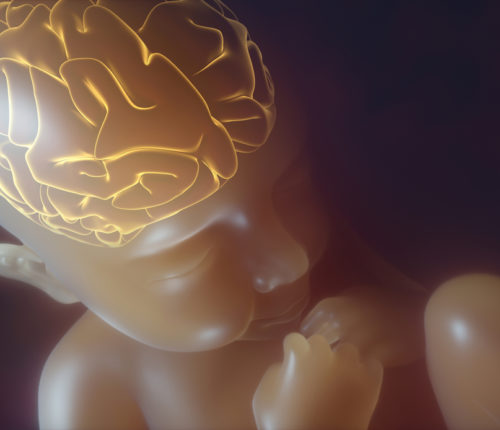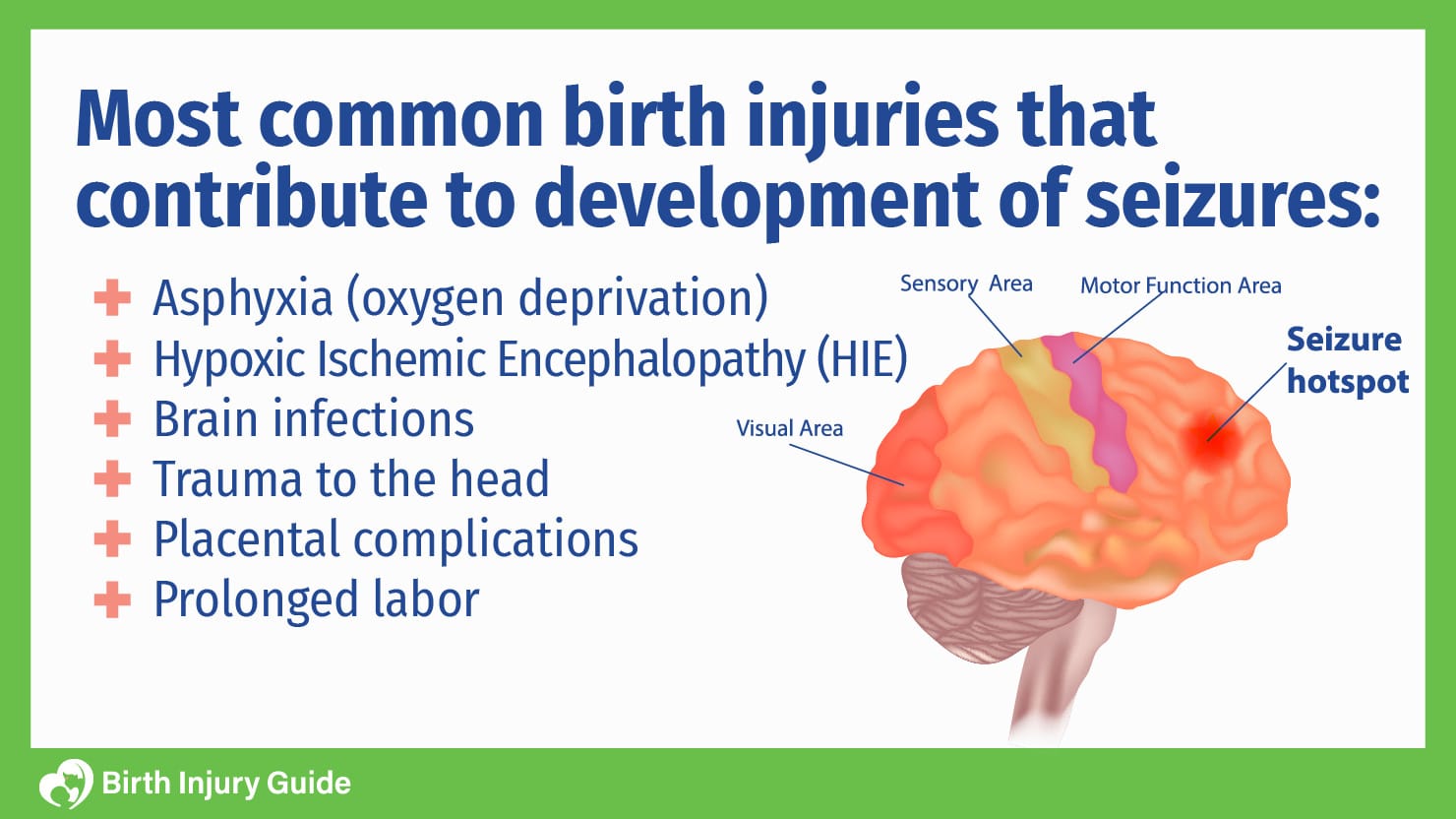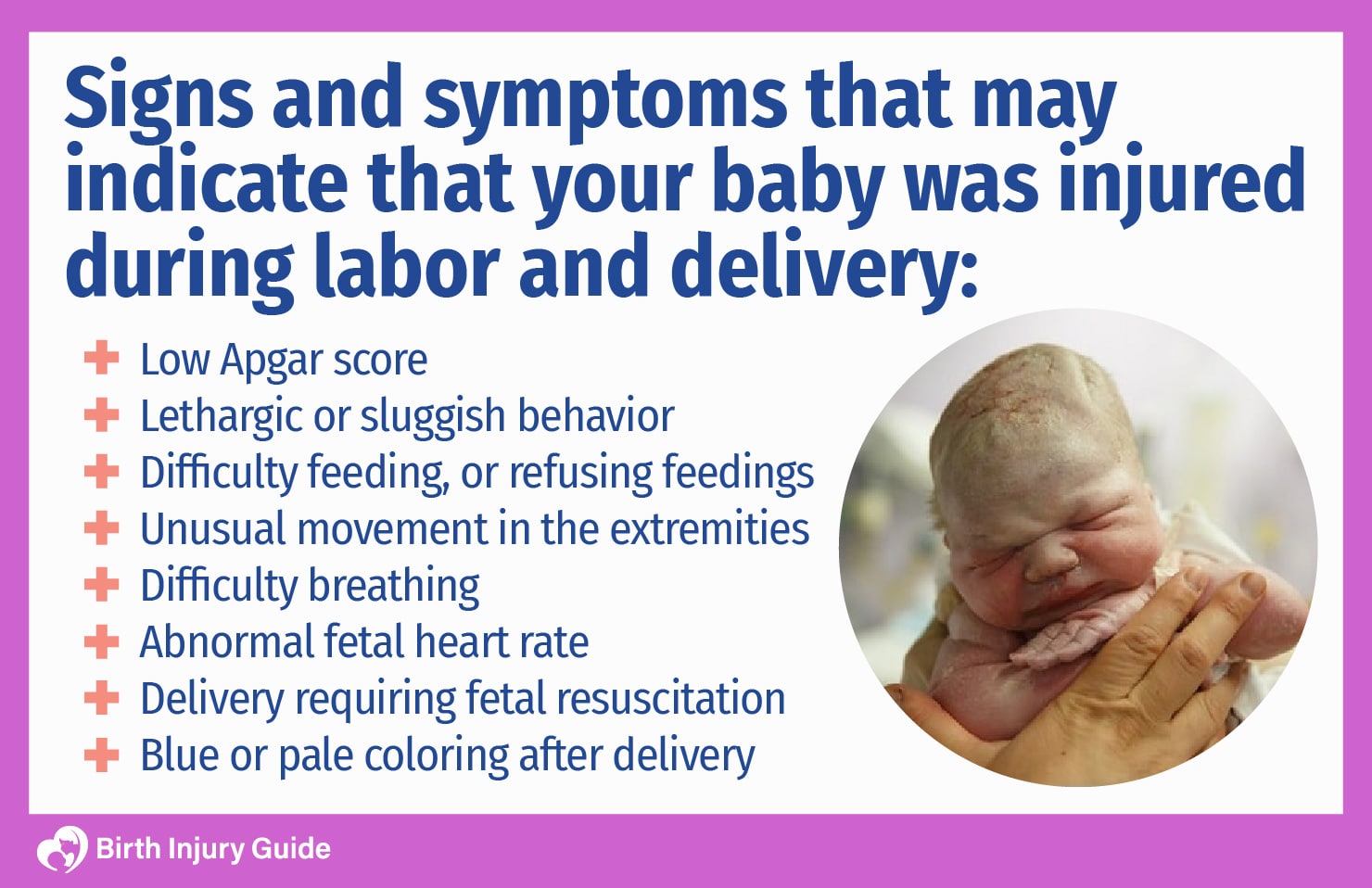
Can Birth Injuries Cause Seizures?
Our attorneys were recently asked “Can Birth Injuries Cause Seizures?” Brain injuries are among the most common forms of birth injuries and can result in neurological problems like seizures. In this article, we will take a closer look at the types of birth injuries that can cause seizures, how seizures can affect your child and your family, and what you can do to get the support and help you deserve after a birth injury.
What are Seizures?
Seizures are uncontrollable electrical disturbances in the brain. There are many different types of seizures, each with their own symptoms and severity. There are focal seizures, generalized seizures, petit mal seizures, tonic clonic seizures, partial, grand mal and myoclonic seizures. Within these types, there are variations in how the seizures affect the patient. Seizures can last anywhere from 30 seconds up to two minutes. Any seizure lasting longer than that should be cause for alarm. Two or more seizures in 24 hours without an identifiable cause, the child may have epilepsy. Seizures and seizure disorders are not always the same thing.
If your child has a seizure, you may notice the following symptoms:
- Change in behavior
- Change in movement
- Loss of sensation
- Loss of consciousness
- Staring spells
- Confusion
- Anxiety, fear, or deja vu
These symptoms can be alarming to parents, and you should contact your doctor right away. It is important to identify the cause of the seizure(s) and determine the appropriate course of treatment. Sometimes the cause is an event like a stroke or head injury; but other times, the cause is unknown.
Can Birth Injuries Cause Seizures?
While some people are diagnosed with idiopathic (unpreventable) epilepsy, many other people experience seizures due to injury. Trauma to the head during, or shortly after birth, can definitely cause seizures.

Some of the most common birth injuries and related factors that contribute to development of seizures in infants include:
- Asphyxia (oxygen deprivation)
- Hypoxic Ischemic Encephalopathy (HIE)
- Brain infections
- Trauma to the head (such as forced labor or improper use of delivery tools)
- Placental complications
- Prolonged labor
Because the head and brain are so delicate in the first weeks of life, it is important that any suspected illness or injury is recognized, diagnosed, and treated immediately. There are many factors that may contribute to birth injuries, and you should never settle for an easy answer if you believe that wrongdoing occurred.
If you need help sorting through a traumatic birth experience that you believe included a preventable injury to you or your child, contact Birth Injury Guide to learn more about your legal rights and birth injury laws.
How do Doctors Diagnose Seizures?
If you suspect that your child is having seizures your doctor will order a series of tests to look at the electrical functions in the brain. The type of seizure your child has depends on where the brain damage occurred and where abnormal electrical activity begins and ends. These tests may include:
- Electroencephalogram (EEG): Uses electrodes to track brain wave patterns and send them to a computer for recording.
- Magnetic Resonance Imaging (MRI): Uses magnetic fields and frequency pulses to take pictures of internal structures.
- Computed Tomography (CT): A very detailed form of X-Ray.
Your doctor will also look at your child’s overall health, and will consider any factors like birth injuries or other injuries.
Signs Your Child May Have a Birth Injury
In addition to active seizures, there are some signs and symptoms that may indicate that your baby was injured during labor and delivery.

Talk to your doctor immediately if your child has seizures and any of the following has occurred, or is occurring:
- Low Apgar score
- Lethargic or sluggish behavior
- Difficulty feeding, or refusing feedings
- Unusual movement in the extremities
- Difficulty breathing
- Abnormal fetal heart rate during labor and delivery
- Delivery requiring fetal resuscitation
- Blue or pale coloring after delivery
Presence of these conditions does not mean that your baby was intentionally or negligently injured, but may be signs that you and your doctor should take a closer look at his or her overall health and your labor and delivery experience.
How Seizures Affect Your Child and Your Family
Seizures can be either temporary, or may be recurring, which is diagnosed as the disease epilepsy. Epilepsy is among the oldest and most common neurological disorders diagnosed worldwide. It is estimated that 30 percent of individuals living with epilepsy are children. Unfortunately, most people are unaware of just how seizures or epilepsy affects sufferers and their families.
Depending on the cause of the seizures or epilepsy, and the extent of the brain injury, the symptoms and effects may vary. There are two primary types of epilepsy (partial and generalized), each with their own primary symptoms. These symptoms may include the following:
- Partial: Episodes and movements affect only part of the body. Seizures classified as partial may include fluttering of the eyelids, tremors or jerking movements, and brief lapses in coherence.
- Generalized: Episodes are more severe and affect the entire body. Generalized seizures may include severe involuntary movements, loss of consciousness, and loss of bladder and bowel control.
Looking more in depth, the range of severity and symptoms associated with seizures is quite broad. Depending on what part of the brain was injured, and to what extent, often determines what symptoms are present. A general list of possible symptoms your child may experience includes:
- Convulsions: Seizures greatly affect bodily movements. Convulsions may range from shaking, fumbling around, falling down, or even severe or uncontrollable jerking.
- Movement Disturbances: May include lapses in coherence, staring, fumbling, jerking, tremors, loss of balance, or inability to control movement.
- Sensation Disturbances: Seizures may interfere with normal sensations like hearing, vision, and taste.
- Mood Swings: People with seizures often battle mood swings and disorders, anxiety, and frustration.
- Neurocognitive Impairment: People with epilepsy often experience disturbances in cognitive functions. They may experience developmental delays, attention deficits, mental slowness, learning difficulties, behavior problems, memory difficulties, and challenged socio-professional outcomes.
Getting Help after a Birth Injury
Many people who suffer birth injuries and go on to live healthy, happy lives. Early detection and treatment is one of the most important factors in birth injury cases, and can be crucial in preserving your child’s future.
If your child was injured during labor and delivery and you believe those injuries were preventable, you may find it helpful to speak with a birth injury attorney. The guidance of a birth injury attorney can help you determine if a birth injury occurred, if a healthcare provider was negligent, and if your legal rights were violated.
Contact Birth Injury Guide to speak with one of our skilled, compassionate birth injury attorneys. We understand the difficult nature of birth injury cases, and our passion is protecting you and your family and getting you the help you deserve. Fill out our online form or call us for your no-obligation consultation.

